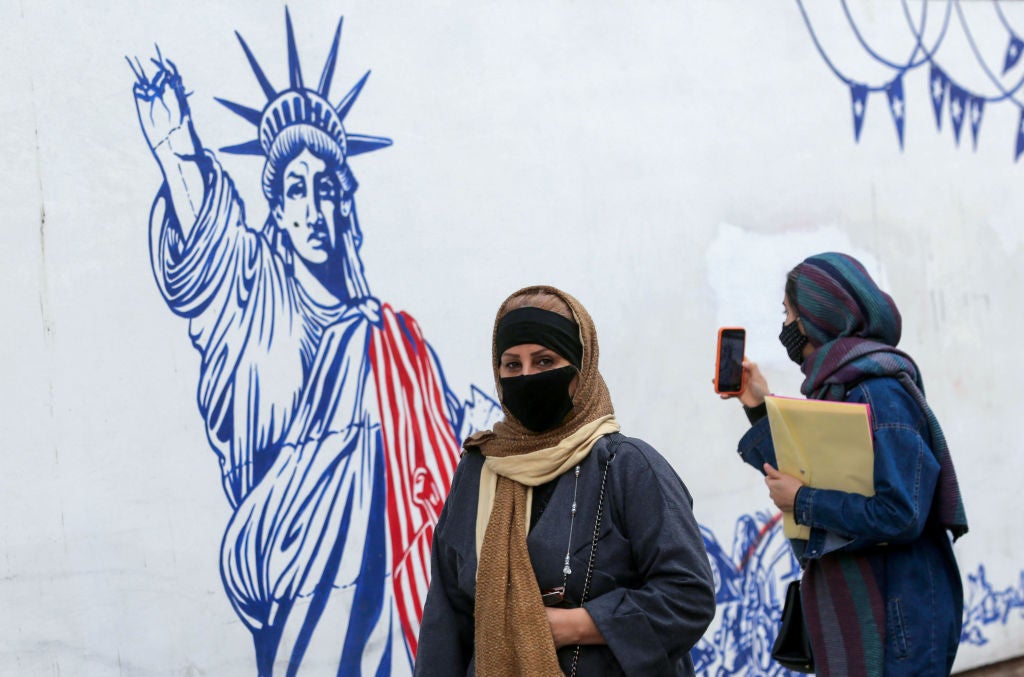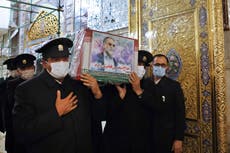Britain has a key role to play in de-escalating tensions between the US and Iran
The UK must close ranks with the incoming Biden administration and give its public opposition to any military strike against Iranian nuclear facilities


Your support helps us to tell the story
From reproductive rights to climate change to Big Tech, The Independent is on the ground when the story is developing. Whether it's investigating the financials of Elon Musk's pro-Trump PAC or producing our latest documentary, 'The A Word', which shines a light on the American women fighting for reproductive rights, we know how important it is to parse out the facts from the messaging.
At such a critical moment in US history, we need reporters on the ground. Your donation allows us to keep sending journalists to speak to both sides of the story.
The Independent is trusted by Americans across the entire political spectrum. And unlike many other quality news outlets, we choose not to lock Americans out of our reporting and analysis with paywalls. We believe quality journalism should be available to everyone, paid for by those who can afford it.
Your support makes all the difference.President Trump is fulfilling the worst fears about him being a bad loser. His bullying of the Republican secretary of state of Georgia indicates that he is not bluffing and really is intent on holding on to power or delaying its transfer for as long as possible, with no limits to the tools he will use.
On Wednesday, his supporters are planning protests in Congress, with a challenge to what should be a routine endorsement of the Electoral College decision. Meanwhile, outside on the streets of DC, Trump’s base are planning demonstrations manned by such groups as the Proud Boys: heavily armed, right wing, and true Trump “believers”.
This threat to domestic peace explains why the surviving 10 former defence secretaries published an open letter in The Washington Post warning against any attempt to use the military in disputing domestic election results.
The possibility that Trump might launch an attack on Iran receives less attention; yet there are worrying indicators we should also take this threat seriously. The first concerning sign is that the incoming Biden defence team have had their briefings by the Pentagon curtailed. Denying access to the incoming team breaks all the rules of party politics and good governance and threatens a dangerous discontinuity in defence over the handover period.
But if you are planning on action you know your successor would not approve of, then isn’t this exactly what you do? Biden has been clear in his intent to revive former president Barack Obama’s key foreign policy achievement: the Joint Comprehensive Plan of Action (JCPOA) nuclear deal with Iran. Trump sees it as his signature achievement that he withdrew the US from this agreement in 2018. Launching an air strike that destroys the Iranian nuclear facilities would both terminate Obama’s achievement and also make Biden’s softer line on Iran still-born.
Such a possibility is given substance by the escalation of activity and the build-up of US and Israeli forces in the region since Trump’s presidential election defeat on 3 November. On 29 November, leading Iranian nuclear scientist Mohsen Fakhrizdeh was assassinated in Iran, by Israel, it is speculated. On 14 December, the pipeline to Iran’s second biggest refinery was struck in a terrorist attack. Recently, the Israeli press has contained numerous articles extolling the virtues of striking Iran’s nuclear facilities, while Trump is still in power, before Biden’s softer line makes such an attack less likely. It is known that the secretary of state, Mike Pompeo, and Israel’s prime minister Benjamin Netanyahu discussed this in their recent meeting in Neom, Saudi Arabia. The 23 December announcement of the next Israeli election in March 2021 has fuelled speculation that striking Iran would boost Netanyahu’s electoral chances.
If a concerted attack on Iranian facilities was ordered, the tools are there to do the job. There has been some media coverage of the build up: B-52 bombers, with supporting tankers and fighter escorts; the USS Nimitz carrier strike force has now re-entered the Gulf having recently been withdrawn; the USS Georgia Tomahawk-equipped nuclear submarine transited the Straits of Hormuz on 21 December into the Gulf (thus increasing both its potency and its vulnerability in the shallows); and the Israelis have sent overtly a Dolphin class attack submarine through the Suez Canal to join US forces (albeit not in the Gulf itself). All Trump has to do is say the word.
Yet it is to be hoped that wiser heads prevail. Immediately after his election defeat, Trump asked for options to strike Iranian nuclear facilities and was talked down by his staff, including Pompeo. (Since then the defence secretary has been sacked and an acting defence secretary put in his place; Chris Miller is a Trump loyalist).
The prevailing attitude among the political-military community is likely best summed up by ex-head of the CIA John Brennan, who described the assassination of the Iranian nuclear scientist as a “criminal and highly reckless” act, risking escalation in an already tense region.
Indeed, this was the fear expressed by the de facto leader of Saudi Arabia, Prince Mohammed bin Salman, at the Neom summit with Pompeo and Netanyahu. Already engaged in a bloody conflict with what they see as Iranian-proxy Houthi fighters in Yemen, the Saudis are nervous of anything that threatens stability or retaliation on their shores. And they, like Israel, are profoundly concerned by the drone technology, which Iran displayed when causing such precisely targeted damage to Saudi oil fields on 19 September 2019.
This capability took the world by surprise and is said to have profoundly altered the balance of threat in the region. This could explain recent intensification of Israeli strikes against targets in Lebanon and Syria, as Israel tries to limit the capability of Iranian proxies near Israel. Set against this, the political appeal of a strike against nuclear facilities seems dangerously unattractive.
Our understandable obsession with Covid and Brexit should not blind us to what is going in the world. Indeed Brexit gives a clear incentive for the UK to close ranks with the incoming Biden administration and give its public opposition to any military strike against Iranian nuclear facilities.
One year ago, the US surprised even its own embassy in Baghdad by launching an assassination of the Islamic Revolutionary Guard Corps (IRGC) general, Qasem Soleimani, outside Baghdad airport. The UK needs to launch a preemptive diplomatic strike now to make the folly of this latest idea clear to the US and to ensure we are not drawn into support of an attack of which we had no prior knowledge.
Major General Jonathan Shaw was Director Special Forces (DSF) and the commander of UK forces in southern Iraq in 2007



Join our commenting forum
Join thought-provoking conversations, follow other Independent readers and see their replies
Comments